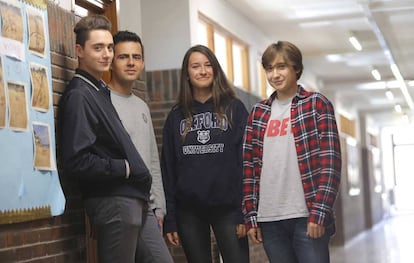Five years after ETA ceasefire, a new generation seeks answers
New documentary made by four students gives a voice to victims of Basque terror group


For many young people in the Basque Country, ETA is a relic from the distant past, and the violence it perpetrated for four decades is still a taboo subject. But not for María López, Jon Otaegui, Jorge El Busto and Cayo Sanz, who were aged just 12 when the armed group brought an end to its campaign of terror on October 20, 2011. Like most of their generation, they had little idea of the importance of the announcement of ETA’s definitive ceasefire. But five years on, they have decided to explore the past and find some answers.
The four students, from San Sebastián, have just made a full-length documentary called Zauriak (Wounds) based on interviews with 17 people who, to varying degrees, have been involved with or impacted by terrorism.
Most people of my age are not interested in this topic, something that I find deeply worrying
María López
“Most people of my age are simply not interested in this topic, something that I find deeply worrying,” says María.
“Young people just don’t talk about it; it’s been forgotten about. The problems in Syria or the terrorism of ISIS seems to concern young people more, as though international issues were more important than what is happening here,” adds Cayo.
Jorge says he remembers the day the ETA ceasefire was announced. He had turned on the news to look at the sports, and scrolling through teletext, saw: “ETA ends campaign of violence.”
“I don’t really remember my first reaction, but if I saw that news today it would have a much bigger impact on me,” says Jorge, whose family was directly affected by the violence: a friend of his father was murdered by ETA for refusing to pay the organization’s so-called revolutionary tax, while his grandfather still remembers the climate of fear in the Basque Country in the 1980s.
Many young people cannot empathize with the ETA’s victims
The four students describe themselves as “young people who are looking for knowledge, who want to understand and above all not forget what happened.” Jon admits that until recently he didn’t fully understand the importance of the ceasefire. “For us, ETA was a bunch of terrorists who had killed a lot of people, and that was it,” he says.
Maria is highly critical of her generation, describing its attitude to ETA as “totally passive.”
By distancing themselves from what ETA did, says Cayo, young people are unable to “empathize” with the victims of the violence. “People of our age don’t talk about what happened, and if they do, it’s in a superficial way. It’s important to be informed, to try to understand what happened, to listen to the people who were there, and to form an opinion about the past,” he concludes.
The four are also critical of the way that the Basque Country’s recent history is taught in schools. “ETA is part of the history of the Basque Country, but it isn’t included as such,” says Jorge. Cayo points out that the Basque regional government has launched an initiative to teach schoolchildren about the impact of the violence.
“If we study Felipe II or the Franco era, then why not ETA’s terrorism?” asks Jon, adding: “Over time, you realize that October 20, 2011 really was a milestone in our history.”
English version by Nick Lyne.
Tu suscripción se está usando en otro dispositivo
¿Quieres añadir otro usuario a tu suscripción?
Si continúas leyendo en este dispositivo, no se podrá leer en el otro.
FlechaTu suscripción se está usando en otro dispositivo y solo puedes acceder a EL PAÍS desde un dispositivo a la vez.
Si quieres compartir tu cuenta, cambia tu suscripción a la modalidad Premium, así podrás añadir otro usuario. Cada uno accederá con su propia cuenta de email, lo que os permitirá personalizar vuestra experiencia en EL PAÍS.
¿Tienes una suscripción de empresa? Accede aquí para contratar más cuentas.
En el caso de no saber quién está usando tu cuenta, te recomendamos cambiar tu contraseña aquí.
Si decides continuar compartiendo tu cuenta, este mensaje se mostrará en tu dispositivo y en el de la otra persona que está usando tu cuenta de forma indefinida, afectando a tu experiencia de lectura. Puedes consultar aquí los términos y condiciones de la suscripción digital.








































